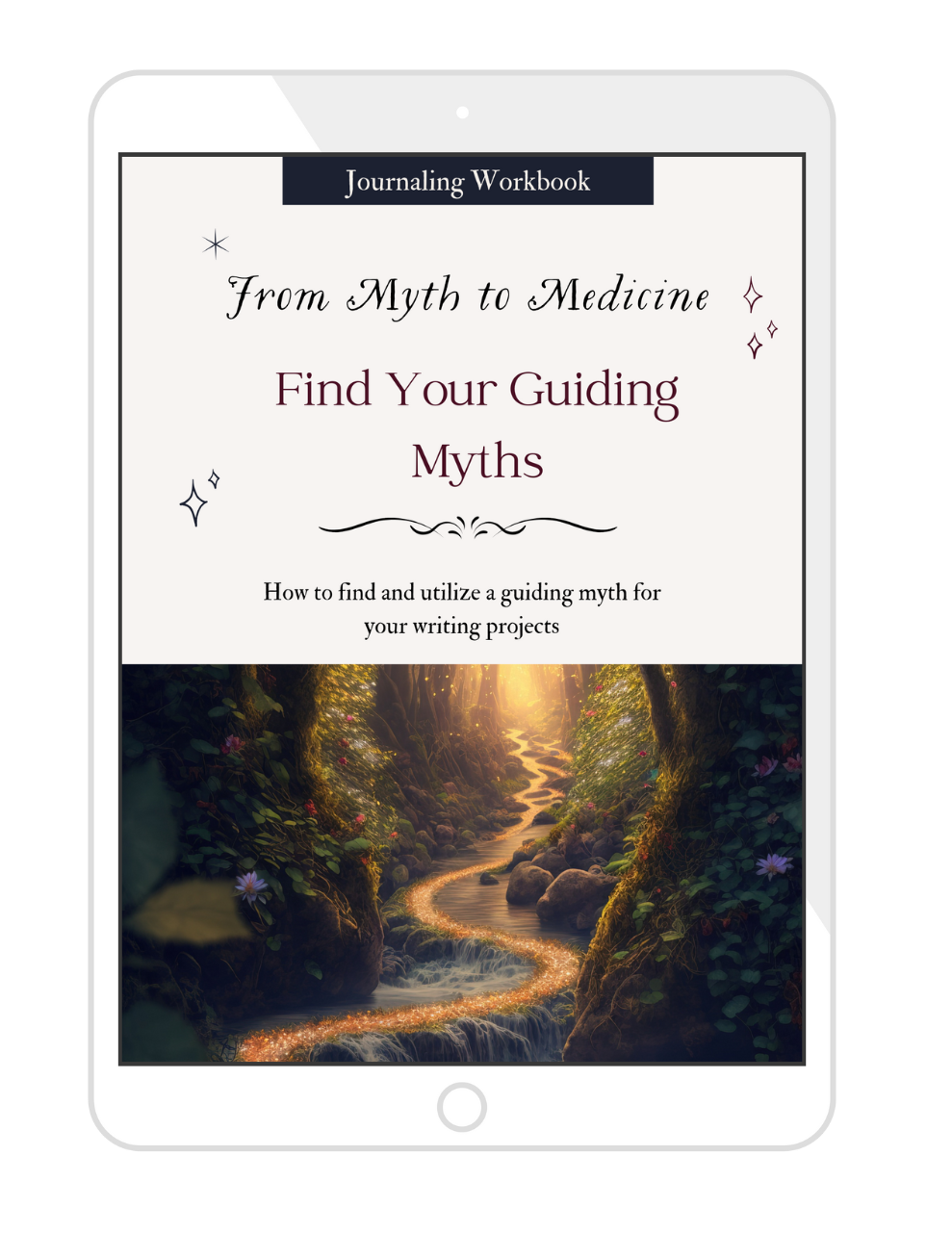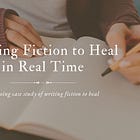If you’re new to The Rebel MFA Way, welcome! This is an essay in my ongoing “Writing Fiction to Heal in Real Time” series where I deep-dive into my writing fiction to heal method as field work and a case study. To begin, I will be working through my story, The Archive, which you can find more information on here.
There’s a free offering at the end ;)
[NOTE: Your email provider may truncate this essay, be sure to click on “keep reading” to read the entire piece.]
burning questions answered.
Before we hop into today’s essay, I promised that I would try to weave in some of the questions I’m receiving as we go.
Do you ever worry that documenting your process will make you too self-conscious about writing The Archive?
Yes. In full transparency, I do worry about this. But it’s also a fear that I know I have to push through because nothing worthwhile ever gets written when you’re “hiding” behind your true and authentic self. I’ve been sharing my work (and myself) in public for a very long time. Even though I’m relatively unknown (said cheekily) — I have had a lot of practice putting myself out there and receiving feedback (the good, the bad and the ugly). So, in a way, this feels like a natural extension of that. Will I freakout when I get a piece of not-so-great feedback? Probably. But I’ll let you into my psyche when that happens.
Do your characters surprise you, or do you always feel like you’re in control of them?
All. The. Time. I know there are plenty of writers and people who don’t believe that this is possible… that us writers are “God” and therefore control everything. Here’s the secret though: if you have the immense pleasure to have relationships with your characters… you don’t control anything. Not really. Sure, you can force your characters and the story to go the way you want, but then it turns from being the true story to being something you’re forcibly shaping. As corny as it may sound, I do believe that I’m not really the one in control… I’m just the vessel.
what the hell is a guiding myth?
Storytelling is magic—literally. My word-witch mentor, Danielle Dulsky, always says, “The original spells were stories.” And if that’s true, then finding the right story can be like finding a map when you’re lost.
Finding your guiding myth doesn’t mean copying it. It means letting it whisper to you while you write, reminding you of the deeper truths your story is trying to tell. It becomes your “North Star,” a place to find yourself again when you feel unsure or shaky about your writing or story.
When The Archive began to take shape, I knew I needed to find my guiding myth(s). A story (or stories) that could act as an anchor, shaping the emotional and thematic core of Ari’s journey. I talk about this in my book, Forged in Fire: Writing Fiction to Heal (Chapter 11), but here’s the quick and dirty version:
Step One: Find stories that call to you—books, movies, myths, legends. Anything that resonates.
Step Two: Strip them down to their bones. What’s the core theme? What draws you in?
Step Three: Dig deeper. Look for older versions, alternative tellings, myths that echo through time.
Step Four: Ask yourself the big questions: Where do you see yourself (or your character) in these stories? What lessons do they offer? What do you reject?
As with most things — the process is simple but not easy.
Now, I’ll show you how I do it.
step one
As I’ve talked about in my two-part essays, “Swimming with the What Ifs” — I spend copious amounts of time with stories before I write a word of a story.
Here’s just a sliver of what I watched, read, and studied (interesting note — many of the books/movies have been re-reads or re-watches)
Books
Ashfall by Mike Mullin [re-read]
Parable of the Sower + Parable of the Talents by Octavia Butler [re-reads]
Mordacious by Sarah Lyons Fleming [re-read]
The Road by Cormac McCarthy [re-read]
Station Eleven [re-read]
The End of the World Running Club [re-read]
The Passage [re-read]
The Handmaid’s Tale [first time read]
The Fifth Sacred Thing [reading now]
Film
Civil War [multiple rewatches]
I Am Legend [rewatch]
The Day After Tomorrow [rewatch]
The Road [rewatch]
WALL-E [rewatch]
The Book of Eli [rewatch]
A Quiet Place: Day One [first time watch]
I Think We're Alone Now [first time watch]
Leave the World Behind [first time watch]
The Matrix [first time watch — I know, I know!]
Cargo [first time watch]
Children of Men [first time watch — again, I know!]
TV Series
The Walking Dead [rewatch]
Snowpiercer [rewatch]
The 100 [rewatch]
The Last of Us [rewatch]
step two
I stripped down all of the above examples to their core themes and made this list:
Survival vs. Meaning
Almost every story here asks: What does survival even mean if there’s nothing left to live for?
Characters don’t just fight for their next meal—they wrestle with whether life, post-collapse, has value beyond basic survival.
The Fragility (and Brutality) of Civilization
These stories explore how quickly and violently society can crumble (and how hard it is to rebuild).
Whether it’s economic collapse (The Fifth Sacred Thing), environmental disaster (The Day After Tomorrow), authoritarian rule (The Handmaid’s Tale), or pandemics (The Passage, I Am Legend), there’s a common thread: once the system breaks, humans become the real threat.
Found Family and Reluctant Bonds
The apocalypse forces unlikely people together, and trust is currency in a world where betrayal is survival strategy.
Characters often begin in isolation (The Book of Eli, I Think We’re Alone Now, Cargo) but find meaning through fragile, reluctant connections.
Power, Oppression, and Who Gets to Survive
Who thrives and who suffers after the fall of civilization is never an accident—it’s always tied to power structures.
Not everyone gets to rebuild—these stories tackle the systems of control that persist even after the world ends (The Handmaid’s Tale, Snowpiercer, The Matrix, The Walking Dead).
The protagonist is often someone from the margins, someone who wasn’t meant to survive (Parable of the Sower, Children of Men, The Fifth Sacred Thing).
Nature Reclaims, and We Are Small
Humanity’s grip on the world is so much weaker than we like to believe.
Whether it’s climate catastrophe (The Day After Tomorrow, WALL-E), the resurgence of the wild (The Walking Dead, Cargo), or literal nature taking over (Station Eleven), these stories remind us:
The earth was never ours to control, and once we’re gone, it moves on.
The survivors are just guests in a world they no longer dominate.
step three + four
By this point — I’d already felt like Octavia Butlers Parable series would be a guiding myth. I try to have at least one ancient myth and one modern myth to keep things balanced.
But… I still needed to find my ancient myth so I dug deeper using the themes I gathered above and ended up finding quite the mixture of guiding myths.
The Arabian Nights
This is the guiding myth that helped me believe I could tell this story like Scheherazade — one tiny tale at a time. Not only is Scheherazade clever, but she wants to survive. And she believes that her key to surviving is through storytelling. Reminds you of Ari, huh?
Anansi Stories
Anansi is the trickster character from many West African tales. In his tales, he is often gathering and weaving stories together (often being cunning and clever while doing so). Trickster energy is VERY powerful energy so I knew having many of Anansi’s stories to approach while writing The Archive would be helpful.
Kali Ma
Though not one specific story or tale — the “myths” of Kali bring the raw, apocalyptic force of destruction that is necessary for rebirth. She reminds me that we often need to clear or destroy the way before us in order to create new narratives. She is the fierce energy needed when Ari (and me) need to find strength to continue on.
So between the Parable series, The Arabian Nights, Anansi, and Kali Ma — I found four (!!!) guiding myths that have served me well thus far. I have zero doubts that they will continue to serve me as I continue writing.
now what?
Once I have my guiding myths locked down, the way I use them is pretty intuitive. There are no rules. You can add, delete or mashup myths. I use my guiding myths mostly for their energy. When I need to write a scene that demands strength and fierceness — I turn to Kali Ma and reread her myths. When I need to figure out a way for Ari to get out of a pickle (and in a clever way), I pick up the Anansi stories. When I start to falter and second guess myself in writing this whole damn thing — you guessed it — I turn to The Arabian Nights. And for just about everything else — I’ve been turning to the Parable series.
In conclusion — guiding myths are a way to reach back into the archives of storytelling and find something that gives you inspiration, hope, guidance, support and comfort. These guiding myths can be incredible powerful allies if you’re willing to do the work to find them and hold them up to the light.
Next time…
Next week, we’re going to take a break from the ephemera and process discussions so I can answer some of your burning questions. They are starting to pile up and I really want to address them! So… if you have a burning question you want answered — feel free to send it to me. Comment on this post, DM me, or email me and I’ll try to get to it in next week’s essay.
FREE: Find Your Guiding Myth Working Session
Beneath every powerful story lies an ancient thread—a mythic blueprint shaping its themes, conflicts, and deeper truths. Whether you’re writing fiction, memoir, or essays, discovering your guiding myth can unlock the heart of your project and give it new depth.
Join me for a live working session where I’ll guide you step by step through the process of uncovering the mythic foundation of your writing. Together, we’ll map out your project’s core themes, find the stories that have been calling you, and uncover the mythic lineage waiting to be woven into your work.
📅 2.23.25 | ⏳ 8am PST / 10am CST / 11am EST | 💻 Live on Zoom - Register Below
If you can’t attend live — still register — I will be sending out the replay to all those registered for the event. This session also includes a workbook!
Don’t want to get these email notifications? Or maybe you want to make sure you get these notifications? Manage your notification settings here:
To read the backstory to why I’m writing this series:
To read the backstory on why I’m serializing “The Archive,”:










Great post! I’m currently working on a poetry collection, and this is really inspiring me to pull together work from other genres and art forms to help me organize it and strengthen the underlying message. Feeling excited about this 🥳